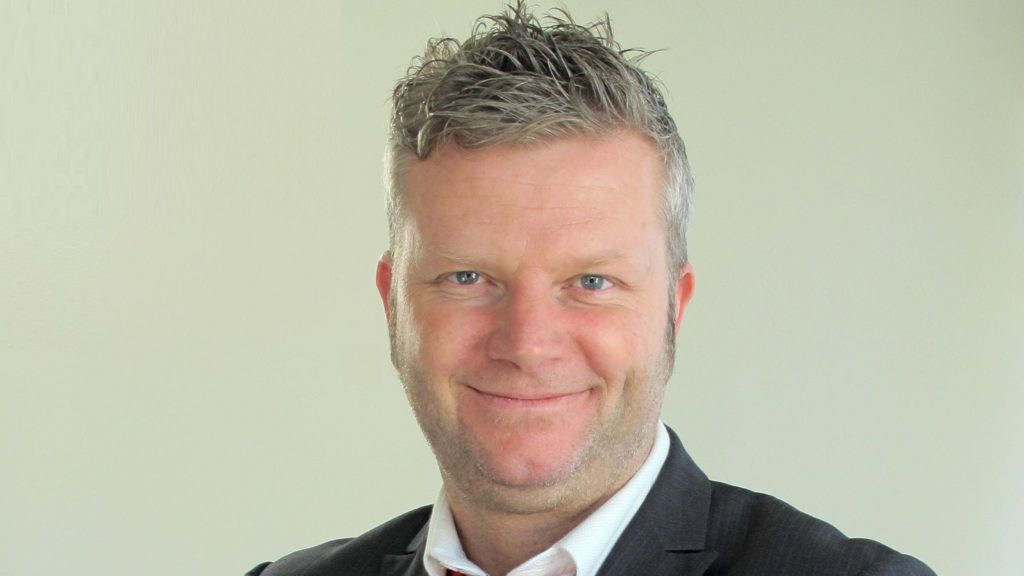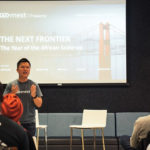LG’s 100-Inch QNED evo AI TV Redefines Big-Screen Viewing in South Africa In a bold leap forward for home entertainment, LG Electronics South Africa…
With corporates you gotta have patience of saint – Sensor Networks founder [Q&A]

Startups must have the patience of a saint when doing business with corporates. So, says Sensor Networks founder Mark Allewell, whose Cape Town startup last week announced that it had secured another round of funding, of R13-million from various local funders.
His company is currently working with five insurance companies to roll out its Internet of Things (IoT) sensors.
“From my experience, sometimes it’s good to be brutally honest with corporate people that you deal with, as they are people as well and if the relationship can’t take criticism, then it’s not worth having that relationship,” adds Allewell (pictured above).
And he should know. Before Sensor Networks he’d started and sold two companies since 2004. The first — Frontline news, a concierge and front office facing trade travel publication — he sold in 2004 to a local investor.
Startups have to have the patience of a saint when trying to do business with corporates, says Sensor Networks founder Mark Allewell
The second — Tourism Radio, an app fitted into hired cars called which he founded in 2005 — he sold to a German Family office in 2006. He worked at the company until 2014 when he left to go backpacking around the world for a year with his family and then 3-year-old twins. On his return he started Sensor Networks in 2015.
Read more: Sensor Networks nets new funding round of R13-million to expand IoT products
Read more: 4Di Capital funding was ‘less than R10m’ confirms SA IoT startup Sensor Networks
In the following interview, Allewell responds to a number of emailed questions about how his startup was able to clinch funding to how to put together a good team — to what he sees as the next IoT trends.
Ventureburn: How were you able to line up the company for successive funding rounds (in August last year and again this month)?
Mark Allewell: This is the third company that I have started and I learnt a lot from starting the previous two (Tourism Radio and Frontline news).
Investors essentially look for somebody that they can invest in. Quite cliché, but regardless of all the noise around investing, somebody is giving you their money.
Sometimes entrepreneurs forget that it’s somebody’s money that they are getting, as there is no face to the person that it actually comes from. It’s so much responsibility promising something to somebody getting money for that promise and not doing your absolute best to repay that money.
VB: How important is putting together a good team?
MA: From my experience if they are happy with the entrepreneur, they’ll look at the team, as it’s up to the entrepreneur to be able to build a world-class team and their ability to convince really smart people that they will be spending a lot of hours building something of value, remembering that smart people can go anywhere.
Great entrepreneurs and great teams have the ability to mould their business into something special, jumping over hurdles, pivoting and generally making it work.
As an entrepreneur, we start businesses thinking we know where we are going and sometimes things change and it’s our ability to make those changes that drive us to success or not.
More importantly for an entrepreneur it’s not just about what the investors want, it’s about who the entrepreneur wants to work with for the next period of time.
Raising money in South Africa is difficult, but I’ve seen entrepreneurs take money from investors for money’s sake, which can be really detrimental to the business in the long run.
It’s very hard to make a business work and you have to have a lot of luck, family or friends support and investor support. If you’re not getting on with investors it makes it that much harder.
VB: How do you work with corporates?
MA: You have the have the patience of a saint in dealing with corporates, purely because of their makeup. They are people the same as us, but because of their environment, personal financial security and layers of staff, they don’t have the urgency.
If you want to deal with corporates, just realise that, deal with it and accept it. From my experience, sometimes it’s good to be brutally honest with corporate people that you deal with, as they are people as well and if the relationship can’t take criticism, then it’s not worth having that relationship.
Some advice was passed on to me a while back and it took some time to sink in. When dealing with a corporate, don’t do anything for free, as the only person that you are pleasing is the person that you are dealing with.
I’ve found that when the accounts person has to pay you, even if it’s few hundred rand, it has to go through the channels of somebody saying we want this, it has value and we are willing to pay for it.
I’ve been asked on numerous occasions to do things on risk. Risk to who? I’m a startup who has a short runway to build a successful business and you get 21 paid holidays a year. Reduce the price, but share the risk.
VB: How will your IoT sensors help insurers to save money?
MA: Insurance companies work on historical data to work out premiums without knowing all the facts. For example, when you move into a house and ask your insurer for cover the insurance companies don’t have data on how old the geyser is.
They know that on average that a geyser will last five and a half years, but don’t know where they are in that cycle, so they have to price that potential claim into the policy.
With our sensor technology we solve a few problems, once again using the geyser as an example. We install our sensor and immediately start to collect data, specific to what we think determines the health of the geyser.
After a period of time, we start to build patterns of geyser claims and the associated data, so will be able to start to predict when and where the claims will happen and they can start to price the policy based on that data.
This can be said for customers water usage patterns as well. Instead of telling us when your geyser should start to heat, tell us what time you want hot water and our sensor intelligence will determine what the best use of the energy is to get the water hot at the required time.
The immediate costs savings for the insurer are reduction of consequential damage, ie your wet carpets when you get home from a weekend away. We’ve built some clever hardware that determines water leakage and stops the inflow, reducing those claims. We currently have a 100% success rate on water leakage.
Finally — I think most important is putting the customer first. Customer data is valuable; with smart sensors, insurance companies are able to really build out personal customer data like never before, pricing each individual on their personal risk.
We believe that this will lead to an “internet of me” scenario, whereby the customer data will be a valuable currency, which has value and can be traded for reduction in insurance premiums, for example. Discovery has done it with health and with IoT growing exponentially, it’s inevitable that model will be transferrable across all of our lives and personal objects.
VB: What can go wrong in IoT systems or strategy around IoT?
MA: Security and people can go wrong. With the advent of social media, people put their trust in technology every day. People don’t realise that there is a real risk that pushing a button on a cellphone opens them up to all sorts of personal security risks.
Technology is moving so fast that there is no real regulation on security and there are so many companies building IoT products that essentially you’re putting your trusts into a company based on a web page or the service that they are offering.
From our perspective, we work within a highly regulated insurance industry and security is the first thing we focus on when building a product.
VB: Where are the next IoT trends expected to come from?
MA: The next best thing in IoT is a single view of data on people’s lives. We currently live life in silos, with each company having data on us, from social media, to banks, to insurance companies to what we search for in the internet.
I don’t know if there will ever be one winner in IoT, but the company that is able to harness the data with a single view across those silos will be in a good position to build incredible products and services.

